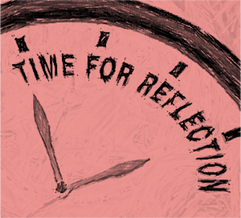 Too many executives and professionals I work with are in a constant rush-hour mode. They continuously have more on their daily to-do lists than they can finish in a day. Most of the time they have back-to-back meetings during work hours and a chronic lack of strategic reflection time in their agenda. The most used tactic to deal with this constant lack of time is "working harder"; working more tense and more hours. Impatience, intolerance for mistakes, a lack of humor and a coaching spirit and tensity are symptoms of this tactic. I believe that this "working harder" tactic has an impact on creativity, spirit and self-management. As a consequence the ability to see bigger pictures, make sense and re-invent, everything that belongs to a strategic focus and inspiration gets under pressure. One of my observations in the organisations I work with, and I believe it is due to the lack of reflection time, is that too little time is taken to recap, repeat and remember "why are we doing this or that" and "how does it contribute to our strategy or values or other shared principles". Slowing down in order to accelerate is a principle taught by Maria Montessori and it is true for people and organisations as well. Far too often the assumption in organisations is that people know why or how or what things are done and that (reflection) time spent on connecting with the past and the guiding principles is wasted. I believe that in our information crowded time we all need reminders and repetitors for the important/strategic stuff in order to become or stay aware that they are important (=re-member). And to be able to reformulate, remind and repeat the important we need reflection time. Whenever I hear "making the strategy is not the issue, execution is" I actually hear "I find it difficult to put my time and attention to strategic priorities". The fact that our Zeitgeist demands business and action from us and that there is a tendency to business addiction in many of us does not help. Reflection time does not always feel as rewarding as action time. It entails fuzziness and contradiction that we are not used to. And it is not always as clear what has been achieved in reflection as opposed to action time. Inner personal reward systems in performance-driven organisations are not always geared to understand the value of strategic reflection time. My call for every executive and professional is to create strategic reflection time to ensure that you do the right things and go home on a time that is good for you. How do you create your own strategic reflection time? Comments are closed.
|
AuthorKatharina Schmidt is the founder of Inspiration & Discipline. She wants to bring strategic inspiration, love & execution discipline to people in organisations. Archives
October 2016
|
|
BRINGING
KINDNESS, INSPIRATION & DISCIPLINE TO PEOPLE & ORGANIZATIONS! |
Dr. Katharina Schmidt PsyD, MBA, MCC
Leadership coach, organizational and team developer Phone: US: +1 4154077341 Europe: +31 622662282 Email: [email protected] |
Welcome to the website of Inspiration & Discipline! We wish you lots of love, inspiration & discipline in everything you do!


 RSS Feed
RSS Feed
